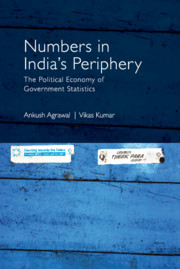1 - State and Statistics
Published online by Cambridge University Press: 24 April 2020
Summary
[In Nigeria,] the census figures became strong political weapons rather than statistical data to be used for planning for socio-economic development.
—Adepoju (1981: 35)In a severely divided society … an election can become an ethnic head count … a census needs to be ‘won’. So the election is a census, and the census is an election.
—Horowitz (2000: 196)Introduction
Over the past two centuries, the deep and multifaceted relation between statistics and statecraft has emerged as one of the defining features of states across the world. Modern states depend on statistics for the planning and evaluation of interventions. The growing size and complexity of operations undertaken by states have deepened their dependence upon statistics. Bureaucratisation and technocratisation of policymaking as well as the growing capacity of non-state actors to challenge government policies have also pushed states towards statistics.
The relationship between state and statistics is not merely instrumental though. Given their intimate relation with the origin and evolution of modern states, statistics are integral to the self-imagination of states and, also, to how they are imagined by people. In its earlier eighteenth-century sense, statistics was ‘a set of administrative routines needed to describe a state and its population’ (Desrosieres 1998: 16), a description of the state by and for itself (ibid.: 147). By the early nineteenth century, almost all Western countries had established statistical offices (Tooze 2003: 2; Urla 1993: 821) as ‘national statistics’ had come to be seen ‘as one of the vital attributes of the nation-states then under construction or seeking to assert themselves’ (Desrosieres 2013: 10). The quality of statistics produced by a country began to be seen as an attribute of its socio-economic and political development, with advanced economies and liberal democracies being associated with better statistical systems (Porter 1995: 80; see also Urla 1993: 821). Around the same time, statistics also began to be seen as enablers of public interest. And the census ‘became less concerned with what the people could be obliged to do for the state and more concerned with what the state could do for them’ (Coleman 2012: 335) amidst an emerging ‘shift towards willing participation [in state-sponsored data collection efforts] on the part of the respondents’ (Bookman 2013: 51; see also Starr 1987: 12; Prewitt 2010: 239).
- Type
- Chapter
- Information
- Numbers in India's PeripheryThe Political Economy of Government Statistics, pp. 3 - 37Publisher: Cambridge University PressPrint publication year: 2020



